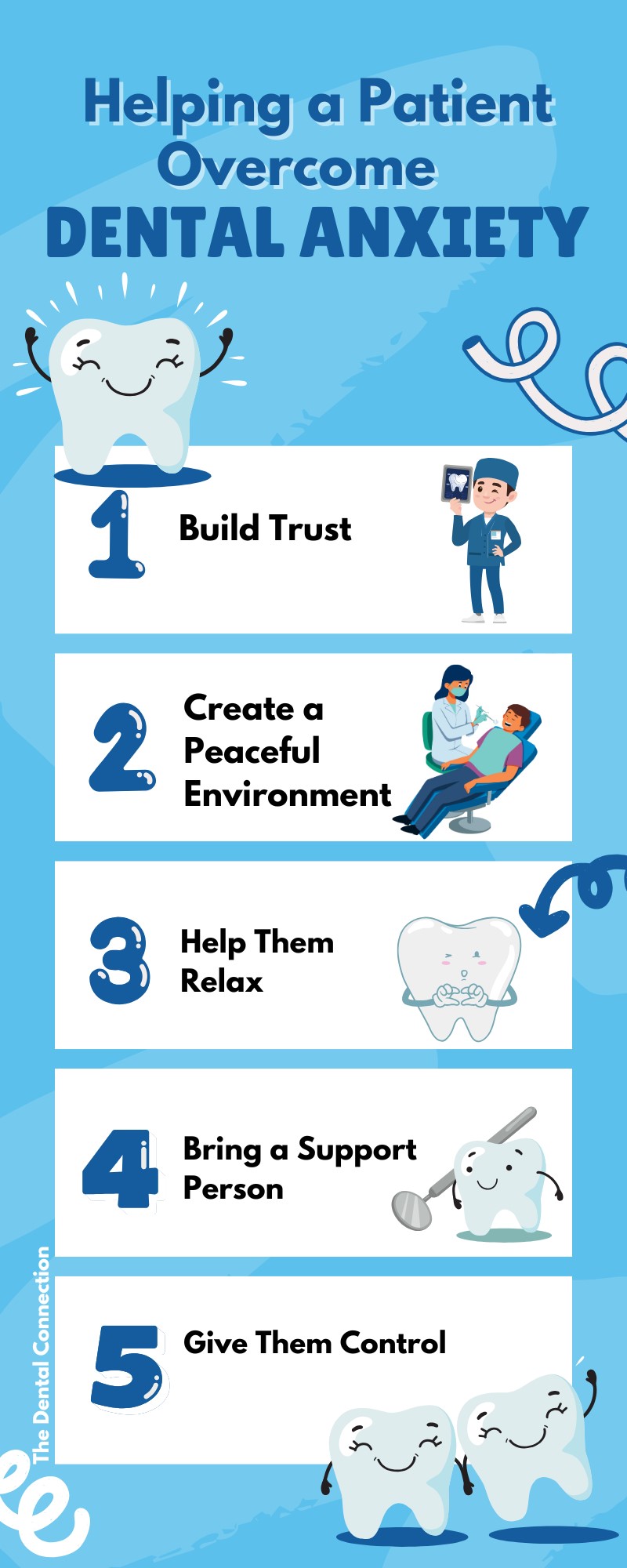General & Cosmetic Dentistry

For many people, just the thought of visiting dentists in Surbiton is enough to make their heart race. They’re not alone! In fact, a recent survey found that a whopping 61% of people worldwide suffer from dental fear and anxiety.
It’s understandable – dental visits can feel intimidating, and anxiety often leads patients to avoid appointments altogether. But this can set them up for bigger issues down the road, from dental pain to more serious health complications.
The challenge? Anxiety doesn’t just affect the patient; it impacts the whole dental team. Anxious patients may feel tense, irritable, or even uncooperative, making it harder to provide the best care.
That’s why it’s so important for dentists and staff to understand the best ways to help patients relax and feel more at ease. In this article, we’ll show you practical tips and techniques to create a more positive experience for everyone involved.
Dental anxiety is incredibly common, and understanding the root causes can help patients feel less alone in their experience. Here are some of the main factors that often contribute to dental fear:
One of the most common triggers is a previous unpleasant experience. Whether it was pain, discomfort, or a lack of empathy from a former dentist, past experiences can make it harder to feel relaxed in future visits.
Many people worry about experiencing pain during dental procedures, even routine ones. This fear can be heightened by stories or images that paint dental work as painful, leading some to avoid visits altogether.
Sitting in a chair with your mouth open while someone works on your teeth can feel vulnerable. For many, this feeling of not being in control can heighten anxiety.
Patients who feel self-conscious about their teeth or overall oral health may avoid going to the dentist for fear of judgment. This embarrassment can build up anxiety, especially if they haven’t had regular check-ups.
For some, it’s the sounds, smells, and sensations in a dental clinic that create discomfort. The buzzing of tools, bright lights, or the smell of antiseptics can trigger anxiety in individuals who are sensitive to these stimuli.
Although bonding can sometimes be used for small cavities, it’s more focused on cosmetic improvements.
Helping patients feel comfortable is key to a positive dental experience. Here’s how a caring dentist in Surbiton can make all the difference:
This process continues until the tooth reaches the desired shape and length. The entire procedure is generally pain-free, and anaesthesia is rarely required, making it a comfortable and efficient way to enhance your smile.
Trust is everything when it comes to easing a patient’s nerves. Take time to get to know them and listen to their concerns.
A friendly chat before diving into treatment can help patients feel seen and heard. Let them know they’re in control; for example, tell them they can raise a hand if they need a break.
Simple gestures like these go a long way in building trust, showing patients that you’re here for them, not just their teeth!
The atmosphere in the clinic plays a huge role in setting patients at ease. Think soft music, warm lighting, and a relaxing waiting area.
For some, even the smell of a dental office can spike anxiety, so using calming scents like lavender can make the space feel less clinical and more inviting.
A calm environment speaks volumes and helps nervous patients feel at home from the moment they walk in.
A relaxed patient is a happy patient! Offering relaxation techniques, like deep breathing exercises or a bit of guided meditation, can help settle nerves before treatment begins.
You might also suggest noise-cancelling headphones with soothing music or a weighted blanket for comfort. These small touches create a positive, personalised experience that helps nervous patients feel safe and cared for throughout their visit.
You might never know, but giving patients a sense of control can work wonders for reducing anxiety.
A simple approach like offering a signal (a raised hand, for example) that lets them pause the treatment anytime can make a huge difference.
Letting them ask questions and understand each step of the process can also help. When a dentist in Surbiton NHS empowers patients with a bit of control, it eases the feeling of helplessness and builds trust.
Having a familiar face in the room can be a big comfort for anxious patients. Whether it’s a friend, family member, or partner, a support person provides emotional reassurance and distracts from any nerves.
Many dentists in Surbiton are happy to accommodate this and understand the positive effect it can have on easing tension. Sometimes, knowing they’re not facing the visit alone can make all the difference!
Virtual reality (VR) isn’t just for gaming – it’s making its way into dental clinics too!
VR can transport patients to a serene beach or calming forest, taking their focus off the treatment. Some dentists in Surbiton are already exploring VR options to create a more immersive, anxiety-free experience.
It’s an innovative way to help patients feel like they’re miles away, even while sitting in the chair.
Early morning appointments can be a great way to keep nerves in check. Scheduling first thing in the day means there’s less time to dwell on any anxiety, helping patients feel fresher and more at ease.
Many dentists recommend morning slots for nervous patients, allowing them to focus on the treatment without the build-up of anticipation.
If you have not been doing this, then it’s time you adopt it. Starting the day with a positive experience can help patients feel more comfortable coming back for future visits.


Don’t be afraid to let your dentist know how you’re feeling. Many dentists in Surbiton are highly experienced in helping anxious patients, and by sharing your fears, they can adjust their approach to make you feel more comfortable.
Clear communication helps the dental team support you in the best way possible.
Anxiety often kicks up our heart rate and breathing, so practising deep, steady breaths can help. Take a few calming breaths before your appointment, and continue the practice while you’re in the chair. It’s a simple way to reduce tension and stay calm.
Listening to calming music or a podcast can help take your mind off the treatment. Bring along headphones and immerse yourself in something comforting.
Many dentist Surbiton NHS practices encourage patients to use this technique to ease anxiety and create a more relaxing experience.
Visualise a positive outcome from your visit, imagining how great it will feel to have completed your appointment. Positive thinking can help shift focus from fear to accomplishment, making each step a bit easier.
Book a check-up just to get comfortable with the environment. Familiarising yourself with the practice without needing a procedure can help you feel more at home. Regular, low-stress visits help reduce anxiety over time, so you feel at ease when it’s time for treatment.
Facing dental anxiety isn’t easy, but with the right support from caring professionals and some simple self-help strategies, it can become much more manageable.
By working together, both dentists in Surbiton and patients can create a relaxed, positive experience that takes the fear out of dental visits.
Remember, you’re not alone in this – your dental team is there to help, whether it’s through gentle reassurance, a calm environment, or flexible options to make your experience as comfortable as possible.
With each step, you’re not just taking care of your smile – you’re building confidence to keep it healthy for years to come.